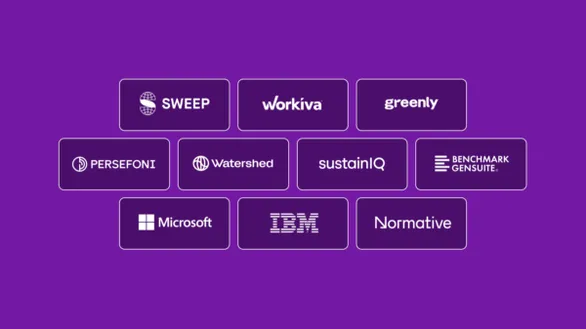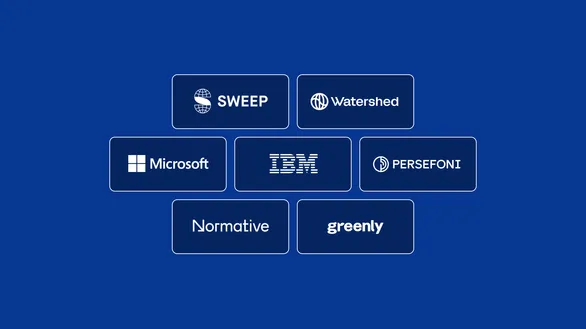ESG (Environmental, Social, and Governance) refers to a set of standards used to evaluate a company’s performance on environmental, social, and governance factors. ESG reporting is the process of disclosing a company’s ESG data, providing them with a comprehensive view of the company’s sustainability performance.
Effective ESG reporting requires streamlined data collection, robust data processing, and comprehensive reporting capabilities. By leveraging ESG reporting software, companies can ensure compliance with regulatory requirements, identify risks, and make informed decisions that drive long-term financial performance and sustainability.
- Sweep
- Workiva
- Greenly
- Persefoni
- Watershed
- SustainIQ
- Benchmark Gensuite
- Microsoft Sustainability Cloud
- IBM Environmental Intelligence Suite
- Normative
Each of these software platforms offers solutions to meet the diverse needs of U.S. companies.
Why ESG Software Matters for U.S. Businesses
An overwhelming 87% of CEOs support incorporating ESG metrics into regular corporate reporting, underscoring the critical role these factors play in shaping modern business practices.
As the demand for sustainability and ethical governance grows, organizations are increasingly turning to specialized software to manage their ESG efforts effectively. This shift is not merely about compliance but about leveraging ESG metrics to drive strategic decision-making, improve transparency, and enhance long-term value creation for the company.
What is ESG?
ESG stands for Environmental, Social, and Governance. It represents a framework for assessing a company’s commitment to sustainability and ethical practices across three key areas:
- Environmental: Greenhouse gas emissions, resource usage, waste management, and climate impact.
- Social: Labor practices, community engagement, human rights, diversity and inclusion.
- Governance: Board diversity, ethical conduct, transparency, executive pay, and risk management.
Together, ESG criteria offer a holistic view of a company’s societal and environmental impact, helping investors make informed decisions about the organization.
Tracking and managing all your ESG data is no longer optional. With regulatory requirements tightening (such as the SEC’s climate disclosure rules and CSRD in Europe), and investors prioritizing sustainability management, businesses need ESG reporting solutions and data management tools to help streamline efforts.
ESG software provides:
- Centralized data collection
- Automated reporting tools
- Compliance features aligned with global standards
- Dashboards to monitor sustainability KPIs and Manage Accordingly
Key challenges in ESG reporting
Despite its growing importance, ESG reporting using ESG software presents several challenges:
- Data collection: Ensuring data quality, especially for Scope 3 emissions and indirect impacts
- Lack of standardization: Metrics vary across industries and regions
- Manual processes: Labor-intensive and error-prone tracking
- Reporting pressure: Need to customize for regulators, investors, and internal shareholders
Benefits of ESG reporting software
ESG platforms address these challenges by:
- Automating data collection and validation
- Enhancing reporting accuracy and timeliness
- Offering customizable dashboards and analytics
- Supporting strategic goal setting through better sustainability data insights
ESG software helps organizations not only comply with regulations but also show leadership in transparency and sustainability management. These platforms also help access and facilitate a better understanding of ESG data among stakeholders, enhancing engagement and transparency.
Can ESG software support compliance?
Yes. Top ESG platforms are built to support compliance with:
- SEC climate-related disclosure proposals (US)
- CSRD and SFDR (EU)
- GRI, SASB, and TCFD frameworks
These software and tools centralize ESG data, validate data accuracy, and generate auditable sustainability reports, which are critical for investor confidence and legal compliance. A great tool also provides access to pre-built templates and accurate data, streamlining the compliance process.
What to look for in ESG software
Key software capabilities and flexibility
ESG tools must evolve with regulations. Look for platforms that include real-time monitoring, risk management, and flexibility for future needs. Ensure the platform supports multiple ESG frameworks to adapt to evolving industry requirements.
Comprehensive ESG management
The software should offer solutions that cover environmental, social, and governance metrics holistically, integrating all relevant data sources.
Automated data collection
Automation ensures timeliness and accuracy in ESG data collection. Look for platforms that reduce manual effort and pull data from diverse sources.
Data integration
A good platform integrates data across departments and systems for a consolidated view of ESG performance. Effective data integration also supports comprehensive emissions management, enabling organizations to access and analyze and report on their environmental impact.
Streamlined reporting process
Choose software and platforms with customizable reporting templates and dashboards for a clear, efficient reporting process and tailored ESG disclosures.
Corporate sustainability and ESG
Corporate sustainability is a critical aspect of ESG, as it involves managing a company’s environmental and social impact while maintaining its financial performance. ESG frameworks, such as the Task Force on Climate-Related Financial Disclosures (TCFD), provide a structure for businesses to report on their ESG performance.
By adopting a comprehensive approach to ESG reporting, organizations can demonstrate their commitment to sustainability, enhance stakeholder engagement, and improve their reputation. ESG reporting solutions can help companies navigate the complex landscape of ESG reporting, ensuring the software meet the requirements of multiple ESG frameworks and stakeholders.
Carbon accounting and emissions
Carbon accounting is a critical component of ESG reporting, as it involves measuring, reporting, and verifying a company’s greenhouse gas emissions. Emissions data is essential for companies to understand their carbon footprint and develop strategies to reduce it.
By leveraging carbon accounting standards and best practices, companies can ensure the accuracy and reliability of their emissions data. This, in turn, enables them to set realistic goals for reducing their carbon footprint and track progress towards achieving them.
Effective carbon accounting also requires a deep understanding of the company’s operations, supply chain, and stakeholder expectations – things that certain software can help assess.
There are multiple frameworks that U.S. organizations should consider in 2025, all of which have the ability to deliver a competitive advantage depending on the industry or application. When you report on ESG, you need to be sure you aren’t missing anything, so consider each option closely.
Overview: Sweep is a leading platform that leverages AI to streamline the collection, management, and reporting of sustainability data for businesses and financial institutions. It simplifies compliance and enhances transparency in ESG practices. Sweep’s AI-powered tools also enhance sustainability reporting, making it easier for businesses to meet their ESG goals.
Key Features: Simplified data collection, customizable surveys, emissions tracking, and supply chain regulations. Adheres to ESG frameworks like CSRD and SFDR.
Why it’s great for U.S. entities: Sweep’s AI-powered tools simplify ESG compliance and supplier tracking, helping U.S. enterprises align with both SEC and global standards.
Overview: Workiva is a cloud-based platform supporting comprehensive ESG data management with collaboration tools and audit trails.
Key Features: Supports financial and ESG disclosures, pre-built frameworks, and efficient reporting workflows. Workiva’s robust ESG reporting capabilities make it an ideal choice for large domestic firms.
Why it’s great for U.S. entities: Headquartered in the U.S., Workiva is designed to meet SEC requirements and integrates cloud based financial and ESG reporting, which are ideal for large domestic firms.
Overview: Greenly helps businesses monitor and reduce CO₂ emissions through real-time tracking and intuitive ESG reporting tools. Greenly’s tools are also suitable for private markets, making it a versatile choice for various business sizes looking to report.
Key Features: Audit-ready data integration, personalized dashboards, and collaborative decarbonization tools.
Why it’s great for U.S. entities: While Greenly is EU-based, its intuitive dashboards and growing U.S. presence make it attractive for mid-sized American businesses beginning ESG tracking.
Overview: Persefoni offers AI-driven carbon management and ESG reporting aligned with emissions standards and investor expectations. Persefoni’s features support businesses in achieving their ESG goals through effective carbon management.
Key Features: AI-powered carbon tracking, Scope 3 engagement, and decarbonization strategy support, all of which help reduce climate related risks.
Why it’s great for U.S. entities: U.S.-based and SEC-focused, Persefoni offers investor-grade emissions reporting ideal for U.S. public organizations, helping assess overall sustainability performance and execute stakeholder reporting.
Overview: Watershed helps companies reduce carbon emissions with planning tools, emissions analysis, and global alignment.
Key Features: Live emissions data, emissions reduction strategy tools, third-party data sourcing.
Why it’s great for U.S. entities: Built for U.S. tech-forward companies, Watershed delivers real-time carbon data and actionable insights aligned with American climate goals. Watershed’s transparency features can also enhance customer loyalty by demonstrating a commitment to enterprise and corporate sustainability management.
Overview: SustainIQ centralizes ESG data for real-time sustainability insights and performance management.
Key Features: Automated and manual data capture, real-time reporting, customizable dashboards. SustainIQ’s customizable dashboards make it easier for companies to generate detailed sustainability reports.
Why it’s great for U.S. entities: SustainIQ offers centralized ESG dashboards that are helpful for U.S. firms seeking transparent, scalable data reporting solutions.
Overview: Benchmark Gensuite unifies ESG, EHS, and operational risk management in a single platform. Benchmark Gensuite offers comprehensive solutions that integrate ESG, EHS, and operational risk management.
Key Features: ESG + EHS integration, real-time AI analytics, customizable performance dashboards.
Why it’s great for U.S. entities: With U.S. roots and strong EHS integration, Benchmark Gensuite is ideal for American manufacturers and energy companies needing all-in-one platforms.
Overview: Microsoft’s ESG solution integrates carbon data across operations for smarter sustainability management.
Key Features: Carbon accounting, audit-ready workflow tracking, intelligent data governance.
Why it’s great for U.S. entities: Backed by Microsoft, this platform offers seamless integration into enterprise systems commonly used by U.S. corporations.
Overview: IBM combines climate and environmental analytics for risk-aware sustainability planning. IBM’s platform offers comprehensive solutions for climate and environmental analytics.
Key Features: Carbon and biomass forecasting, emissions projections, climate risk mapping.
Why it’s great for U.S. entities: IBM’s U.S.-centric focus on environmental intelligence helps domestic firms anticipate climate risks and build resilient operations within corporate sustainability.
Overview: Normative is a carbon accounting platform that helps companies pursue net-zero goals with better data transparency.
Key Features: Scope 3 emissions visibility, small supplier support, and emissions planning tools. Normative’s robust tools support efficient ESG data collection and reporting.
Why it’s great for U.S. entities: While European in origin, Normative’s robust Scope 3 capabilities and carbon calculator make it suitable for U.S. businesses pursuing net-zero targets.
Data assurance and audit readiness
Data assurance is a critical aspect of ESG reporting, as it involves ensuring the accuracy, completeness, and reliability of ESG data. Audit readiness requires businesses to have robust systems and processes in place to collect, process, and report ESG data.
By implementing comprehensive data management solutions that drive actionable insights, companies can ensure that their ESG data is accurate, up-to-date, and accessible to stakeholders. This, in turn, enables them to demonstrate their commitment to transparency and accountability, reducing the risk of reputational damage.
It also requires organizations to have a deep understanding of metrics, reporting frameworks, and stakeholder expectations.
Measuring the ROI of ESG Software
ROI can be measured through:
- Cost savings: More efficient data collection and reduced compliance risk
- Investor confidence: Better transparency increases funding opportunities
- Operational insight: Real-time ESG data drives better decision making
Effective sustainability reporting can also enhance investor confidence and operational insight.
Over time, ESG software helps businesses build long-term value, mitigate regulatory risk, and enhance reputation.




